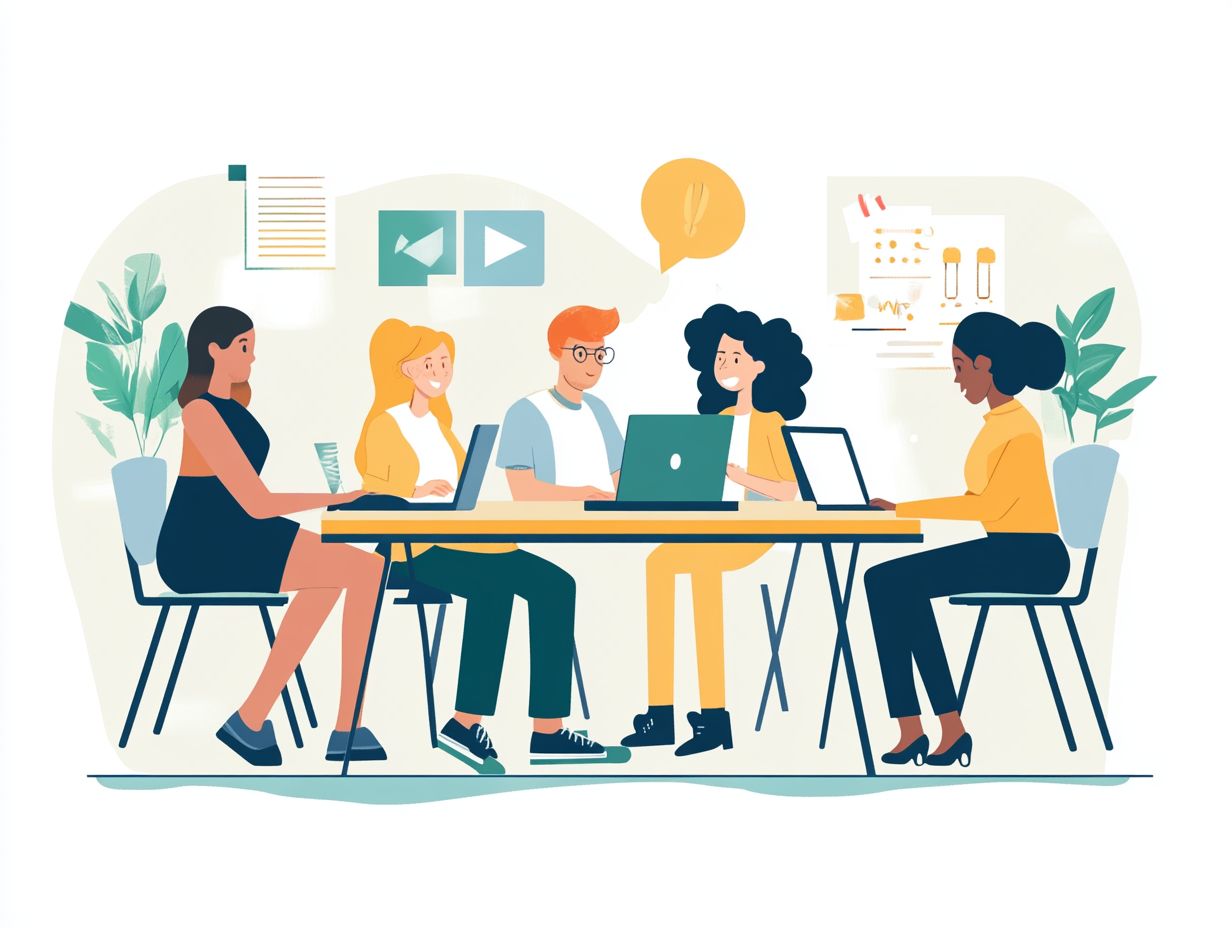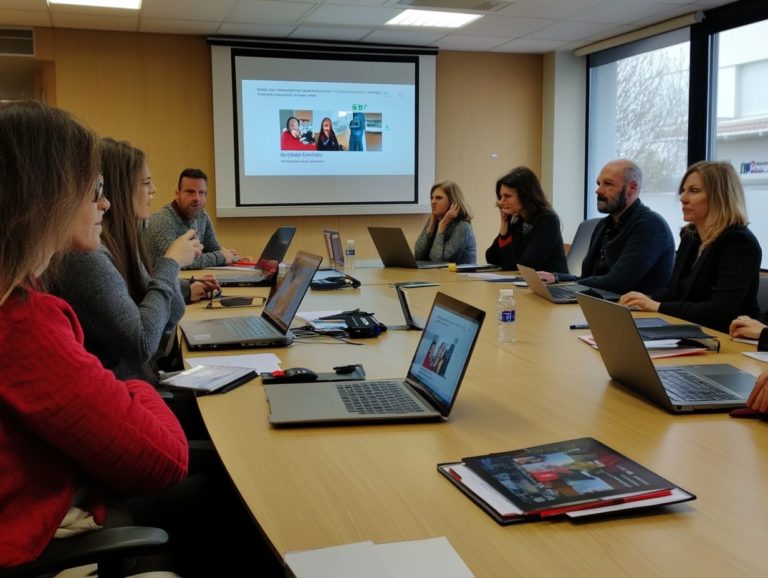E-Learning Solutions for Soft Skill Development
In today s fast-paced professional landscape, soft skills have become indispensable tools for success, enhancing your technical expertise and transforming workplace dynamics.
Effective communication and strong leadership abilities are just a couple of the interpersonal skills that can significantly shape your career trajectory.
This article delves into the critical importance of soft skills and highlights how e-learning can serve as a powerful method for their development.
Explore the top soft skills that can propel your career forward, discover the engaging techniques that e-learning offers, and gather practical tips for integrating this approach into your own journey.
Jump in now and unlock your full potential!
Contents
- Key Takeaways:
- Top Soft Skills for Professional Success
- How E-Learning Can Help Develop Soft Skills
- Implementing E-Learning for Soft Skill Development
- Frequently Asked Questions
- What are e-learning solutions for soft skill development?
- Why are e-learning solutions becoming popular for soft skill development?
- What are the benefits of using e-learning solutions for soft skill development?
- How can e-learning solutions for soft skill development be implemented in an organization?
- What types of soft skills can be developed using e-learning solutions?
- Are there any downsides to using e-learning solutions for soft skill development?
Key Takeaways:

- Soft skills are essential for professional success and can be developed through e-learning.
- E-learning offers interactive and real-world scenarios for practicing soft skills like communication, time management, and leadership.
- Choosing the right e-learning platform and courses, and measuring progress are key to success.
Defining Soft Skills and Their Importance
Soft skills are the essential people skills that help you communicate effectively and collaborate seamlessly.
They are key to navigating workplace relationships.
These skills significantly influence your overall performance and encompass a range of competencies, including emotional intelligence, problem-solving abilities, and leadership qualities. All of which contribute to a harmonious and productive work environment.
In today s competitive landscape, mastering these soft skills isn t just a nice-to-have; it s crucial for achieving client satisfaction, boosting team productivity, and driving both organizational success and your personal career growth.
Soft skills are vital in various professional settings, facilitating smooth team interactions and enhancing customer relations. For instance, effective communication can bridge gaps between departments, fostering better cooperation on projects and sparking increased innovation.
Emotional intelligence allows you to empathize with your colleagues, building a culture of trust and support.
When you leverage these interpersonal attributes effectively, you contribute to improved morale, reduced conflict, and heightened overall performance.
Organizations that prioritize the development of these skills often find themselves far better prepared to adapt to change and pursue strategic goals.
Benefits of Using E-Learning for Soft Skill Development
E-learning presents a wealth of advantages for soft skill development, enhancing employee skills with e-learning solutions and transforming training programs into accessible, flexible, and engaging experiences for you and your colleagues.
This innovative approach transcends geographical barriers, allowing employees from various locations to join the same training sessions seamlessly.
The freedom to access materials anytime and anywhere enables you to learn at your own pace, perfectly aligning with your work commitments and personal life.
Incorporating gamification elements greatly enhances engagement, drawing you deeper into the content.
Techniques like role-playing and simulation not only solidify your understanding but also provide a safe space for practical skill application, ultimately nurturing both confidence and competence for real-world challenges.
Top Soft Skills for Professional Success
To attain professional success, it’s essential for you to master the paramount soft skills that are vital across diverse industries.
Skills like effective communication, teamwork, emotional intelligence, problem-solving, leadership, and time management enable you to navigate challenges and cultivate positive relationships in the workplace.
These competencies not only elevate your performance but also enhance client satisfaction and boost team productivity, rendering them critical in today s dynamic work environment.
Communication Skills
Communication skills are essential for effective collaboration and fostering positive workplace relationships. They enable you to articulate your ideas clearly and build rapport with colleagues and clients alike.
These skills encompass a wide range of abilities, including both verbal and non-verbal communication. Elements like tone of voice, body language, and facial expressions all play crucial roles in ensuring your messages are conveyed accurately. Active listening is particularly important, as it allows you to fully engage with the perspectives and concerns of others.
By providing constructive feedback, you can enhance understanding and promote continuous improvement within your team.
Emotional intelligence enriches these interactions by helping you recognize and manage your own emotions as well as those of others. This leads to improved client satisfaction and strengthens professional bonds, creating a more harmonious work environment.
Time Management Skills

Mastering time management skills boosts your productivity and helps you meet deadlines without sacrificing the quality of your work.
By effectively prioritizing tasks, planning your workdays, and delegating responsibilities when necessary, you not only make your work easier but also uplift the overall morale of your team.
Incorporating specialized training materials on time management into your programs is vital. Such resources equip you with valuable strategies, leading to improved performance, lower stress levels, and a more harmonious work environment.
Leadership Skills
Leadership skills embody a suite of attributes that enable you to inspire and guide your team toward shared goals, significantly impacting both productivity and morale.
A strong leader like you recognizes the vital role of decision-making. You evaluate situations with clarity and precision, ensuring your choices align with the team’s values and objectives.
When combined with effective conflict resolution skills, you can navigate disagreements with empathy, transforming potential discord into valuable opportunities for collaboration and growth.
Emotional intelligence is the backbone of your leadership abilities. It allows you to recognize and manage your own emotions while responding to the feelings and experiences of others. This empathetic approach nurtures a supportive work environment and enhances your problem-solving capabilities.
How E-Learning Can Help Develop Soft Skills
E-learning offers you a dynamic platform for cultivating essential soft skills. It enhances the effectiveness of training programs through interactive learning and innovative training methods, making it a key component of talent development strategies.
By leveraging online resources, your organization can provide diverse training materials tailored to various learning preferences and needs.
This flexibility enables you to engage in personal growth and skill development at your own pace, nurturing a culture of continuous learning and improvement in the workplace.
Interactive and Engaging Learning Methods
Interactive and engaging learning methods are essential in e-learning. They not only capture your attention but also enhance your retention and application of soft skills in real-world scenarios, which is why e-learning solutions are designed to meet diverse learning needs.
Take gamification, for instance. Gamification, or using game-like elements in training, makes learning fun. When you earn points or badges for completing tasks, it transforms the experience into something enjoyable and competitive.
Simulations provide you with the chance to practice skills in a realistic environment, alleviating the anxiety often tied to real-life situations.
Quizzes act as both assessment tools and engaging activities, reinforcing your knowledge and ensuring that concepts remain firmly embedded in your mind.
By integrating these dynamic strategies, organizations like yours can witness significant improvements in employee performance. Individuals become increasingly adept at applying the skills they’ve learned.
Ultimately, these interactive formats foster deeper learning and facilitate long-term retention, paving the way for successful outcomes in the workplace.
Start your journey today and unlock your potential!
Real-World Scenarios and Role-Playing Exercises
Utilizing real-world scenarios and role-playing exercises in your training programs significantly enhances your learning experience. These methods allow you to practice soft skills in realistic contexts.
These interactive methods create a safe environment where you can navigate complex situations and explore different perspectives. You ll refine your approach to problem-solving, which directly correlates with improved emotional intelligence.
As you engage in these exercises, you develop empathy and communication skills, both of which are vital for fostering better relationships among team members. Incorporating these innovative learning strategies elevates your overall performance and cultivates a collaborative and supportive workplace culture where everyone can thrive.
Implementing E-Learning for Soft Skill Development

Implementing e-learning for soft skill development requires a strategic approach that encompasses creating good courses, careful selection of the right learning management system, and ongoing assessment of progress. Utilizing e-learning solutions for upskilling employees can further ensure successful outcomes.
Choosing the Right Platform and Courses
Choosing the right platform and courses for e-learning is essential to enhance the effectiveness of your soft skill development initiatives within your organization, paving the way for lifelong learning.
When selecting an e-learning platform, you must carefully evaluate several key factors. User-friendliness is critical; learners should navigate the content with ease to minimize frustration and boost engagement.
The quality of the content is equally important. It should be informative, relevant, and curated to meet your specific learning objectives. Alignment with your organizational goals is also vital; the courses you choose should address the soft skills that are key to your company s growth and culture.
By considering these elements, you can tailor your training solutions and cultivate a more proficient and adaptable workforce.
Measuring Progress and Success
Measuring your progress and success in soft skill development is crucial for understanding how effective your training programs are. You must measure your progress to ensure effective learning.
You can adopt various methods to gauge this progress effectively. Feedback mechanisms, like peer reviews and discussions with supervisors, provide real-time insights into your growth.
Performance metrics from completion rates of training modules to observable behavioral changes offer the data needed to quantify your advancement.
Evaluation surveys can further enhance this process by collecting your responses about your learning experience and confidence in applying those newly acquired skills.
Integrating these assessments provides a clearer picture of your development and enriches the overall training strategy, ensuring a more meaningful learning experience.
Frequently Asked Questions
What are e-learning solutions for soft skill development?
E-Learning solutions for soft skill development refer to online courses, programs, or modules designed to help individuals improve skills like communication, leadership, time management, and teamwork using digital platforms. Additionally, there are also e-learning solutions for technical skill training that can enhance your expertise in various fields.
Why are e-learning solutions becoming popular for soft skill development?

E-learning solutions for soft skills training are becoming popular due to their accessibility, flexibility, and cost-effectiveness. Individuals can learn at their own pace and convenience without spending money on commuting or physical materials.
Ready to enhance your soft skills? Explore our courses today!
What are the benefits of using e-learning solutions for soft skill development?
E-learning solutions enhance time management skills and improve communication abilities.
They also foster self-motivation and self-discipline. Plus, learners can access materials anytime, anywhere.
How can e-learning solutions for soft skill development be implemented in an organization?
To implement e-learning, give employees access to online courses. Build a culture where learning never stops, and blend online training with existing programs.
What types of soft skills can be developed using e-learning solutions?
You can develop various soft skills through e-learning, including communication, leadership, teamwork, problem-solving, time management, adaptability, and emotional intelligence.
Are there any downsides to using e-learning solutions for soft skill development?
A downside to e-learning is the lack of face-to-face interaction and feedback. Some learners may struggle with motivation and tracking progress without a traditional classroom structure.
Explore e-learning today! Unlock your potential and enhance your skills in a flexible and engaging way.






